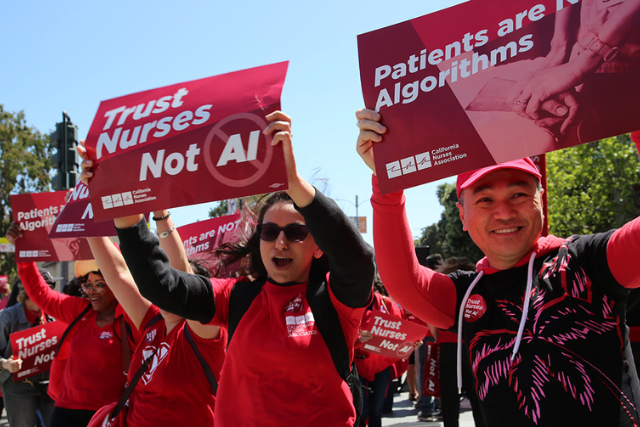Dressed in red shirts and carrying signs reading, “Trust nurses, not AI,” hundreds of nurses from across California gathered outside Kaiser Permanente’s San Francisco Medical Center to protest the increasing use of artificial intelligence (AI) in the healthcare industry. The demonstration, organized by the California Nurses Association (CNA), took place on Geary Boulevard, where nurses voiced concerns about AI’s untested and unregulated nature, fearing it could harm patient care.
Michelle Gutierrez Vo, a family medicine nurse, emphasized that certain applications of AI are unacceptable. The protest coincided with Kaiser Permanente’s International Integrated Care Experience conference in the Bay Area, a three-day event discussing AI and advanced analytics in healthcare.
Kaiser Permanente, an early adopter of AI in healthcare, has integrated the technology across various areas of patient care. However, the CNA, which represents 24,000 Kaiser nurses, is pushing for more involvement in decisions regarding AI’s implementation. While nurses support technology that enhances their practice, Gutierrez Vo said AI’s current use threatens to erode the nursing profession by introducing untested technologies.
Cathy Kennedy, a neonatal intensive care nurse, acknowledged that AI is here to stay but expressed concerns that its primary purpose is cost-cutting, rather than improving patient outcomes. She questioned whether expanding AI in healthcare is truly beneficial, pointing out how some existing technologies, such as electronic records tied to staffing, can create inefficiencies. If records are not updated promptly, it can lead to staffing shortages.
In response, Kaiser Permanente stated that AI is intended to assist nurses, not replace them, and is designed to improve both patient outcomes and nurse satisfaction. However, Gutierrez Vo highlighted a critical issue: AI chatbots are sometimes offered as an alternative to speaking with a nurse. These chatbots, which rely on medical terminology, may fail to recognize life-threatening symptoms if patients don’t use the exact terms, potentially leading to dangerous situations.

The CNA is advocating for comprehensive evaluation and oversight of any new AI technologies before they are introduced into healthcare settings. Nurses from other healthcare systems echoed these concerns, with some reporting that AI tools have added to their workload. For instance, Melissa Beebe, a nurse at UC Davis Medical Center, explained that the AI used to monitor patient vitals often issues false alarms, leading to inefficiencies.
The National Nurses United (NNU), representing 225,000 nurses nationwide, has been particularly vocal about the risks associated with AI in healthcare. During a recent media briefing, union representatives stressed that while AI may be used for tasks such as predicting sepsis or determining patient acuity, these tools are not always reliable. Nurses often find that their assessments differ from AI-generated reports, with 48% stating that automated hand-offs fail to include critical information.
The NNU has called for all AI used in healthcare to adhere to the “precautionary principle,” which demands the highest level of protection for unproven innovations. The union also argues that nurses should have the authority to override AI decisions, as current algorithms often fail to detect subtle patient changes that only human nurses can notice.
In May, the NNU introduced an AI Bill of Rights, advocating for transparency, regulatory oversight, and the right for nurses to make clinical decisions without repercussions. The bill also includes demands for informed consent and data privacy for patients.
The union continues to push for stricter regulations, citing concerns that the current FDA framework for approving AI technologies is outdated and inadequate. Michelle Mahon, assistant director of nursing practice at NNU, emphasized that AI tools must meet strict safety standards, calling for the immediate discontinuation of any technology that does not meet these criteria.
Ultimately, nurses across the country are advocating for greater involvement in the development and implementation of AI tools in healthcare to ensure that patient safety remains the top priority.
Are you interested in how AI is changing healthcare? Subscribe to our newsletter, “PulsePoint,” for updates, insights, and trends on AI innovations in healthcare.




